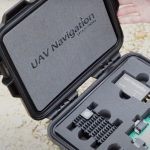 NAO Campus schematic
NAO Campus schematicThe French engineering consultancy Pole Star SARL has expanded the firm’s development activities with the launch of its first products — NAO City and NAO Campus, designed to improve the robustness of GNSS positioning in urban and indoor environments with a focus on location-based services.
The French engineering consultancy Pole Star SARL has expanded the firm’s development activities with the launch of its first products — NAO City and NAO Campus, designed to improve the robustness of GNSS positioning in urban and indoor environments with a focus on location-based services.
The two OEM products are based on Pole Star’s Navigation Algorithm Overlay (NAO) technology, a software layer that enables hybridization of positioning data with resident mapbases on host user equipment — typically personal navigation devices (PNDs), personal digital assistants (PDAs), and smart phones.
NAO City combine GPS raw data with map information to strengthen the availability and accuracy of navigation in urban canyons that frequently mask satellite signals. According to Pole Star, the NAO hybridization technique provides assistance for pedestrian applications for which traditional map-matching technique may not succeed and is compatible with most nav. NAO City
NAO Campus extends the approach by incorporating WiFi signal power measurements to provide positioning services inside buildings as well as outdoors. Typical applications include lone worker protection, indoor navigation or tracking, and operation in shopping centers, museums, and car parks.
The products have a typical one-Hertz refresh rate and output data in NMEA 0183 format and, in the case of NAO Campus, a proprietary binary interface. They are compatible with Windows Mobile operating systems and, in the near future, Linux. A Pole Star reference receiver configuration uses the SiRFstarIII GPS receiver from SiRF Technology.
The company has signed a partnership agreement with Tele Atlas to combine the digital mapping company’s databases with Pole Star’s technologies.
Pole Star was founded in Toulouse in 2002 by Jean Chenebault and Christian Carle. It oopened a Shanghai, China, office in 2006, and another in March 2008 in the European Space Incubator near the European Space Agencvy’s technical center in Noordwijk, The Netherlands.
For more information: website <www.polestar-corporate.com>, e-mail <info@polestar.eu>, or telephone 33-5-3460-9520.
Copyright © 2008 Gibbons Media & Research LLC, all rights reserved.





